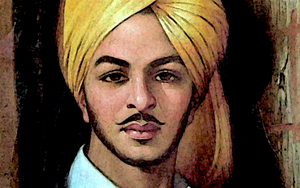 Surat, Feb 17: A UK-based historian described Indian freedom fighters -- Bhagat Singh and Chandrashekhar Azad -- as "terrorists" during a lecture held here recently, sparking a controversy.
Surat, Feb 17: A UK-based historian described Indian freedom fighters -- Bhagat Singh and Chandrashekhar Azad -- as "terrorists" during a lecture held here recently, sparking a controversy.
Delivering a lecture on 'Nonviolent Resistance In India during 1915-1947', Warwick University's professor David Hardiman said, "Terrorist groups, who predate Mahatma Gandhi, were always there alongside Gandhi's non-violent movement."
"Some of these famous figures were Bhagat Singh and Chandrashekhar Azad, who were involved in organisations like Hindustan Republic Association (HRA) and Hindustan Republic Socialist Association (HRSA)," the professor of United Kingdom's history said.
Speaking at the 24th I P Desai Memorial Lecture organised by Centre for Social Studies on February 14, Hardiman also said that Gandhi's movement was benefited due to other means of protests.
"Every non-violent movement has a violent group aiming to achieve the same ends with armed movement. The group often indulges in terror acts like bombings, shootings and assassinations. The non-violent movement was benefited because the authorities feel it is better to deal with them than the dangerous terrorists," Hardiman said.
Hardiman's remarks against the Indian revolutionaries angered the audience, who compelled him to clarify, following which, he said, "I did not use the word terrorists as a derogatory term."
Major Unmesh Pandya, member of executive council of Veer Narmad South Gujarat University, who was amongst the audience, stood up during the lecture and protested against Hardiman's remarks.
"The UK-based scholar used word terrorists seven to eight times for the revolutionaries. There is a unanimous understanding between the academicians of the entire world not to use the word terrorist for the people who had not killed innocent civilians. One can use words like extremist or revolutionary," Pandya said.
"A terrorist means who terrorises people. But freedom fighters like Bhagat Singh or Chandrashekhar Azad initiated armed movement against imperialism. If one considers any violent or armed movement as a terror activity, then under that definition British Raj or Queen Victoria's activities can also be defined as terrorism," he added.
Defending Hardiman, Professor Ghanshyam Shah, a political scientist and member of the Board of Governors of Centre for Social Studies, said his remarks should be taken in a different periodical contexts.
"The context is different. At that time, non-violent movement was going on and certain people chose another way, including Bhagat Singh, Azad, Shyamji Krishna Verma and Savarkar. They had difference of opinions with Gandhi's non-violent movement. In that sense, he (Hardiman) said Bhaghat Singh involved in a movement other than the non-violent movement.
"But he surely did not equate the revolutionaries with the present jihadi terrorists. Bhagat Singh himself believed in militancy based freedom movement, he chose that way. One has to analyse Hardiman's words in proper contexts," Shah said.
Condemning Hardiman's comment, human rights activists and a scholar of Bhagat Singh's works, Hiren Gandhi termed the remarks as "logical in the context of a Britisher".
"We believe he was a revolutionary, they (Britishers) believe he was a terrorist. That is very natural and logical for a Britisher. Bhagat Singh had done 79 days hunger strike that shows he also believed in non-violence and satyagraha. His ways might be different from the Gandhian ways, but then he cannot be described as a terrorists," said Gandhi.
Quoting Bhagat Singh from 'Collected works of Bhaghat Singh', Gandhi said, "To root out imperialism and its vested interests and to bring socialism, terror acts are necessary.
"Bhagat Singh believed that revolution does not mean change of power, but it also implies transformation of society. That transformation can be achieved after a long process, which includes violent and non-violent ways," Gandhi said quoting Bhagat Singh.





Comments
Add new comment